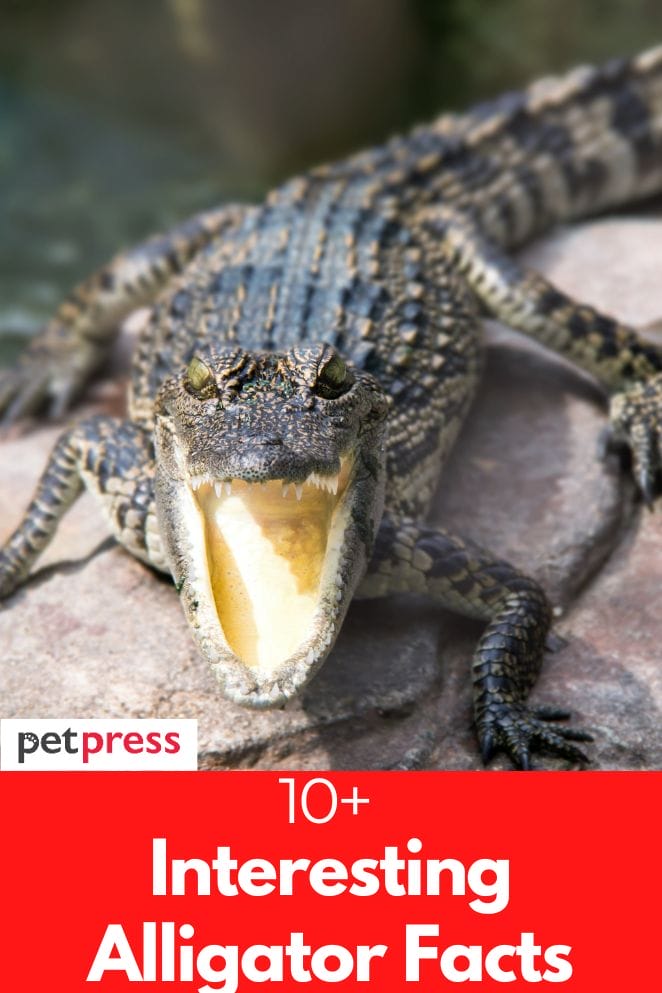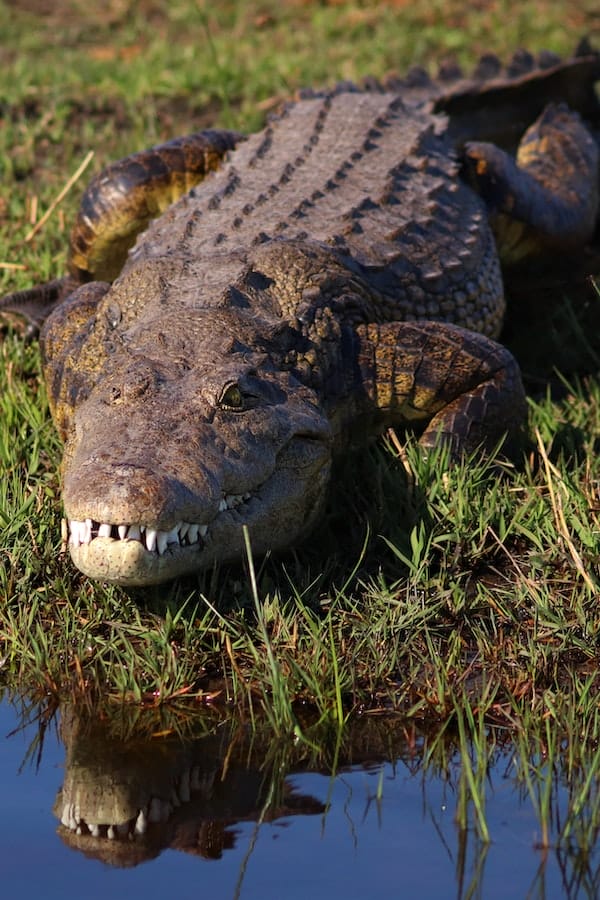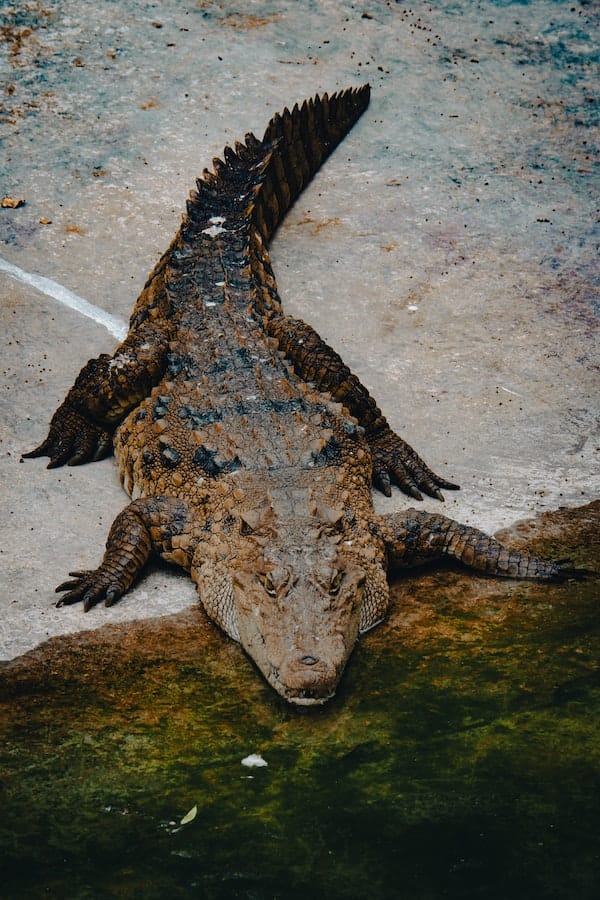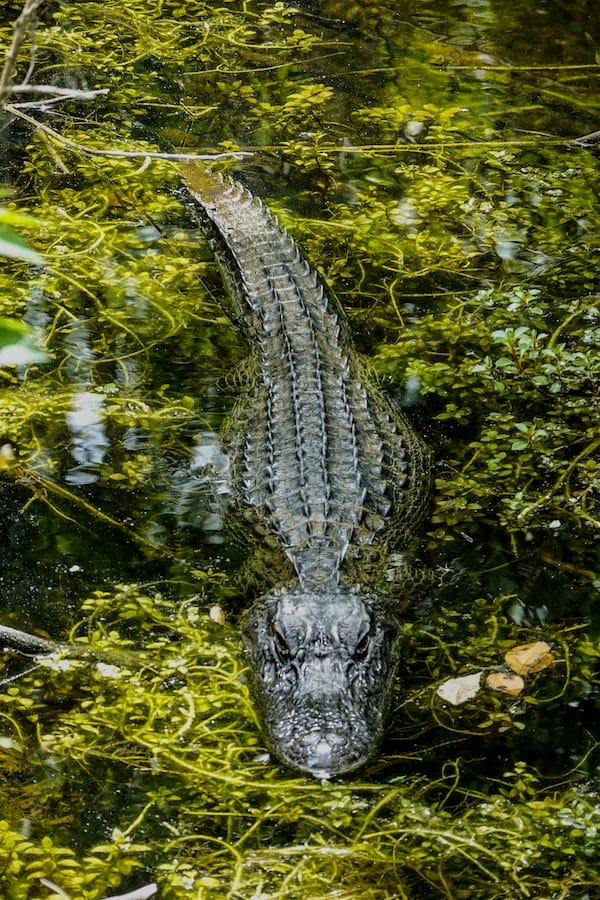
Alligators have been around for millions of years and can be found in parts of the United States, China, and even some parts of Australia.
They are fascinating creatures that many people don’t know much about.
Here we will take a look at some interesting facts about alligators that you may not have heard before. Keep reading to discover some interesting alligator facts!
Fact #1: Alligators have incredibly strong bites.
Alligators have incredibly strong bites, so it’s important never to get too close to them!
They are able to exert tremendous pressure with their jaws and can easily crush through the shells of turtles, clams, and other prey.
The bite force of an adult alligator can be up to 2,125 pounds of pressure per square inch, making it one of the strongest bites in the animal kingdom.
This is definitely something to remember when you’re around alligators – keep your distance!
Fact #2: Alligators can go through a massive growth spurt in their first year.
Alligators have the ability to grow very quickly in the first year of life.
This is because they take advantage of a growth spurt period during which they can eat up to seven times their own body weight every day!
In just one year, an alligator can go from being 6 inches long to over 7 feet long!
This amazing ability to grow is due to the alligator’s incredibly efficient metabolism and digestive system.
So, if you ever see an alligator in the wild, remember that it isn’t always small – it could just be at the start of its impressive growth spurt!
Fact #3: Alligators can stay underwater for a very long time.

Alligators can hold their breath underwater for a surprisingly long amount of time – up to two hours!
This is because they have a special valve located in the back of their throat that helps them take in air while still.
Keeping their mouth closed and allowing them to remain submerged.
This adaptation is incredibly helpful for alligators as it allows them to stay hidden from prey and also conserve energy by not having to come up for air as often as other animals might.
Additionally, alligators can swim very quickly in bursts when they need to escape predators or catch prey, making them even better at remaining underwater for long periods.
Fact #4: Alligators have a very keen sense of smell.
Alligators have an incredibly keen sense of smell that helps them find food or detect potential predators.
They can pick up on smells from distances as far away as 1 mile and can even detect minute chemical changes in the air that might indicate potential prey.
This is thanks to their long snouts and nasal passages, which can capture even faint environmental scents.
Alligators also use their sense of smell to communicate with other alligators, so if you ever get too close, they’ll be able to detect your presence right away!
Fact #5: Alligators can live a very long time.
Alligators have the potential to live for decades in the wild, with some individuals reaching 100 years of age!
This is because they can regulate their internal temperature in response to their environment and have an incredibly efficient digestive system that allows them to extract maximum nutrition from their food.
Additionally, alligators are relatively low-maintenance creatures and don’t require much in terms of care or attention, making them well-suited for long life in the wild.
Fact #6: Alligators are an important part of the ecosystem.
Alligators play a vital role in their ecosystems by helping to maintain a balance between predators and prey.
They keep populations of other animals, such as fish and turtles, in check while also providing food for larger animals, such as birds of prey.
Additionally, alligators help to keep rivers and wetlands clean by eating dead or decaying organic matter, which can lead to contamination if not removed promptly.
They also contribute to the natural beauty of an environment with their unique presence and impressive size!
- Related post: Best Names for Crocodiles & Alligators
- Related post: 6 Great Pet Reptiles for Beginners
Fact #7: Alligators are an endangered species.

Alligators were once a common sight in many parts of the United States, but due to habitat destruction and hunting, they have become endangered in some areas.
Populations have been reduced drastically by unsustainable harvesting practices as well as pollution and changes to the environment.
Fortunately, conservation efforts are helping to replenish alligator populations in some areas, and the U.S. Fish and Wildlife Service has listed them as a species of special concern.
It’s important that we continue to do our part to protect alligators and their habitats so that they can remain a part of our world for generations to come.
Fact #8: Alligators have inspired many cultural stories and beliefs.
Alligators have been a source of fear, fascination, and folklore for thousands of years.
Native Americans believed that alligators were the gateway to the spirit world, while some African tribes saw them as powerful protectors of their people.
In some cultures, alligators were used in traditional healing rituals and ceremonies or even worshipped outright.
Today, alligators have become a part of popular culture through movies, books, songs, and stories about them—allowing us to continue to appreciate the power and majesty that these incredible creatures possess.
Fact #9: Alligators are a threatened species but can be conserved.
Alligators have been included in the United States Endangered Species Act and many other international conservation efforts, as these reptiles represent an important part of our environment.
But despite these protections and efforts, alligators remain threatened.
To conserve them, it is important to ensure that their habitats are protected from human interference, especially from activities such as hunting and development.
Additionally, protecting the water quality of wetlands and rivers where alligators live is another key part of conservation.
Fact #10: Alligators have been around for millions of years.

Alligators are living fossils, having roamed the Earth in their current form for millions of years.
They were present at the time of the dinosaurs and have managed to survive through several ice ages and periods of climate change.
This is a testament to their incredible adaptability and resilience—qualities that can teach us a lot about being environmentally conscious today.
By understanding the importance of alligators in our world, we can ensure that they continue to survive for millions more years into the future.
Fact #11: Alligators are a keystone species.
Alligators play an important role in maintaining the balance of their ecosystems, as they are considered keystone species.
As apex predators, alligators help to control the population of prey species such as fish, turtles, and small mammals, which in turn keeps the entire food web in balance.
As a result, alligators are an integral part of the wetlands and rivers where they live—so preserving them is essential for maintaining healthy ecosystems that can support many other species.
Alligators are an impressive and unique species with a rich history and deep cultural significance.
From inspiring folklore to maintaining healthy ecosystems, alligators have much to teach us about our relationship with the environment.
The more we understand about alligators, the better equipped we are to protect them from the threats they face—and ensure their survival for many more years to come.
This is why it is so important to continue learning about alligators and their habitats and supporting conservation efforts that give these incredible creatures a chance to remain a part of our world for generations to come.
- Does Cat Litter Melt Ice? The Complete Guide to Winter Safety - January 30, 2026
- Happy Tail Dogs: Understanding This Common Canine Condition - January 29, 2026
- How Cold Can Outdoor Cats Handle? Feline Winter Safety - January 27, 2026


GIPHY App Key not set. Please check settings